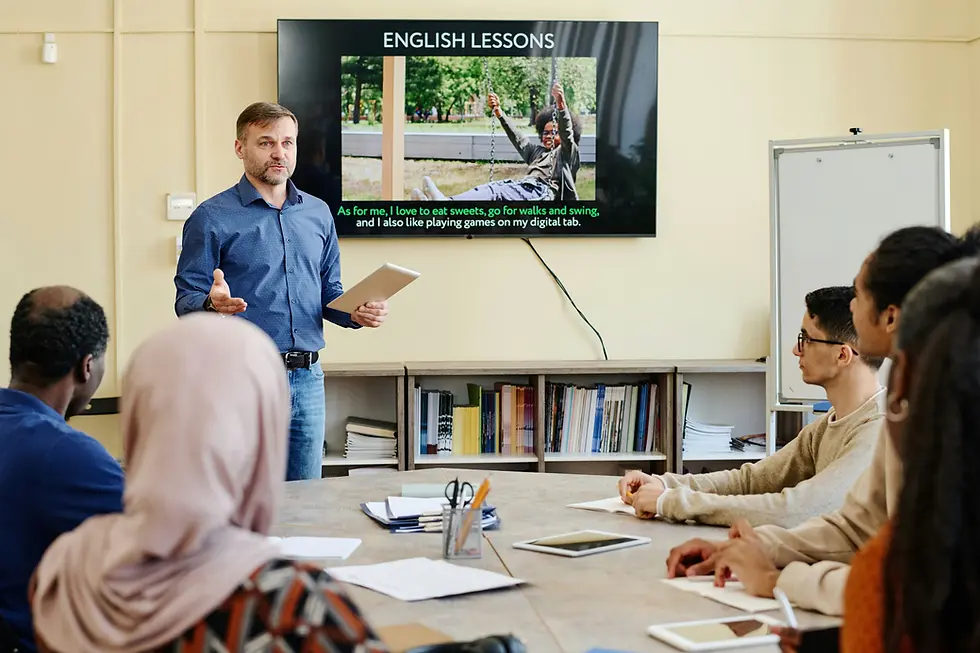What Is the Easiest Language to Learn?
- Adam Krell
- Mar 19
- 8 min read

Choosing a new language to learn can be a thrilling adventure, especially when you consider the potential to open up new cultural insights and career opportunities. For English speakers wondering, "What is the easiest language to learn?" there are several contenders that stand out due to their simplicity in terms of grammar, pronunciation, and vocabulary. Whether you’re a young learner or an adult, picking an easy language can boost your confidence and provide a foundation for acquiring more complex languages later on.
Understanding Language Difficulty Levels
When considering the easiest languages to learn for English speakers, it’s important to factor in linguistic similarities and the learning resources available. Languages like Spanish and French not only share thousands of words with English but also offer abundant learning tools that make them accessible choices.
Language Fluency Levels
Achieving fluency in a new language involves progressing through various levels of proficiency, from basic understanding to advanced communication skills. Each language has its own set of challenges that can affect how quickly you can move from one level to the next.
Fluency levels, commonly designated from A1 to C2, help learners understand where they stand and what they need to achieve next. Here’s a brief overview of each level:
A1 (Beginner): At this level, you can understand and use very basic phrases aimed at the satisfaction of needs of a concrete type, such as personal details or daily tasks.
A2 (Elementary): You can understand frequently used expressions related to areas of most immediate relevance (e.g., basic personal and family information, shopping, local geography, employment).
B1 (Intermediate): You start to produce simple connected text on topics that are familiar or of personal interest. You can handle travel situations in areas where the language is spoken.
B2 (Upper Intermediate): You can interact with a degree of fluency and spontaneity that makes regular interaction with native speakers quite possible without strain for either party.
C1 (Advanced): You can use the language flexibly and effectively for social, academic, and professional purposes. You can produce clear, well-structured, detailed text on complex subjects.
C2 (Proficiency): At this highest level, you can easily understand virtually everything heard or read and can summarize information from different spoken and written sources, reconstructing arguments and accounts in a coherent presentation.
What Makes a Language Easy to Learn?
The ease of learning a language often depends on its similarity to your native language. For English speakers, languages that use the same Roman alphabet and have a significant amount of cognates (words that sound similar and have the same meanings) like Spanish, Italian, and French, are generally considered easier. Additionally, the availability of resources such as apps, online courses, books, and multimedia resources can greatly ease the learning process.
What Is the Easiest Language to Learn for English Speakers?

From the rhythmic melodies of Italian to the straightforward syntax of Dutch, let’s explore which languages offer the smoothest transition for native English speakers:
Spanish
Is Spanish easy to learn? Absolutely. It’s not only spoken by over 600 million people worldwide, but its grammatical rules are consistent, and its pronunciation is straightforward. This makes Spanish one of the easiest languages for English speakers to learn.
French
Is French easy to learn? For many, yes. French pronunciation might take some getting used to, but its vocabulary has had a profound influence on English. This, coupled with its romantic allure, makes French a popular and relatively easy choice.
Italian
Is Italian an easy language to learn? With its melodious sounds and rhythmic patterns, Italian is not only easy to grasp in terms of basic grammar and vocabulary but is also one of the most enjoyable languages to learn.
Dutch
Often overlooked, Dutch is like a simpler, more straightforward version of English with fewer exceptions and closer cognates, making it one of the easiest languages to learn for English speakers.
Portuguese
Is Portuguese easy to learn? Yes, particularly if you already know Spanish. Portuguese shares a lot of similarities with Spanish in terms of vocabulary and grammar, though the pronunciation can be a bit challenging.
Swedish and Norwegian
Is Swedish hard to learn? Not really. Swedish, along with Norwegian, offers simple grammatical structures, a lot of cognates with English, and is generally straightforward in terms of pronunciation.
What Is the Easiest Language to Learn for Asian Languages?

When exploring the easiest Asian language to learn, many might be surprised to find that languages such as Indonesian or Malay stand out for English speakers. These languages offer several features that simplify the learning process:
Indonesian
Grammar Simplicity: Indonesian grammar does not incorporate gender or tense, which are common stumbling blocks in many other languages.
Phonetic Consistency: The language is mainly phonetic, making it easier to read and pronounce words as they are written.
Malay
Linguistic Similarities: Malay shares some vocabulary with English due to historical trade and colonial relationships, easing the learning curve.
No Tonal Quality: Unlike many Asian languages, Malay does not use tones, which can be one of the more challenging aspects for English speakers to master.
What Is the Easiest Way to Learn a New Language?
Learning a new language can seem daunting at first, but with the right approach, it can become an engaging and rewarding experience. Here are some strategies that can simplify the process and increase the effectiveness of your language-learning journey.
Immerse Yourself in the Language
Daily Practice
Consistency is key when learning a new language. Engaging with the language every day, even if it's just for a short period, can significantly boost your learning curve. Regular interaction with the language helps solidify vocabulary and grammar, making it second nature over time.
Use of Media
Listening to music, watching movies, or reading books in the target language can dramatically improve your listening and comprehension skills. These activities immerse you in the cultural nuances and idiomatic expressions, enhancing your linguistic abilities and cultural understanding.
Interactive Learning Tools
Language Apps
Tools like Duolingo, Babbel, or Rosetta Stone are designed to make language learning accessible and fun, integrating games and quizzes to reinforce learning. These apps adapt to your learning speed and help build vocabulary and grammar skills through progressive challenges.
Online Courses
Platforms like Coursera or Udemy offer structured courses that can guide you from beginner to advanced levels at your own pace. These courses often provide comprehensive lessons that cover all aspects of the language, including writing, reading, speaking, and listening.
Engage in Conversation

Language Exchange
Partner with a native speaker who wants to learn your language. This can be done through language exchange websites or local meetups. Such interactions allow for practical use of the language in a conversational setting, which is crucial for fluency.
Practice Groups
Joining a language practice group can provide practical speaking opportunities and feedback from fellow learners. These groups allow you to practice speaking in a safe and supportive environment, helping you to build confidence and fluency.
Structured Learning Approach
Take Classes
Enrolling in language classes at a community college or language school provides structure and routine, along with professional guidance. Classes often offer a balanced approach to language learning, incorporating various educational techniques that cater to different learning styles.
Hire a Tutor
A private tutor can offer personalized attention and tailor lessons to fit your learning style and goals. This one-on-one approach allows for adjustments in pacing and focus, addressing specific challenges you may face.
Cultural Immersion

Travel
If possible, travel to a country where the language is spoken. Immersion in daily life and culture is one of the most effective ways to master a language. This hands-on experience lets you practice the language in real-life situations, speeding up the learning process.
Cultural Events
Attend local cultural events or exhibitions that focus on the language and culture you are studying to enhance understanding and appreciation. Engaging with the culture helps solidify language skills and gives deeper insights into the context in which the language is used.
The Role of Language Courses
Finding the easiest language course can be as crucial as picking the right language. Total Tutors, located in the heart of Orange County, offers specialized language programs that cater to young learners, ensuring that the language learning process is not only easy but also fun.
Conclusion: What Is the Easiest Language to Learn?
Ultimately, the best language to learn is the one that you’re most interested in and will stick with. Whether it’s for personal satisfaction, professional advancement, or travel, choosing a language that resonates with you and your goals is key. Remember, the easiest language isn't always the most "useful," so consider your interests and needs.
If you're looking to enhance your language learning journey or if you need support with any other academic subjects, Total Tutors is here to help. Our experienced educators are dedicated to providing personalized tutoring that caters to your specific needs and learning style.
Whether you're starting with a new language or preparing for a crucial exam, let us guide you toward success. Contact a tutor in Orange County to learn more about our programs and how we can assist you in achieving your educational goals!
FAQs About What Is the Easiest Language to Learn

Is English the easiest language to learn?
For many, English is challenging due to its irregular spellings and complex grammar.
What is the easiest language to learn for Spanish speakers?
Portuguese often tops the list due to its close linguistic ties to Spanish.
What is the easiest second language to learn for someone who
speaks English?
Dutch and Norwegian are strong contenders because of their grammatical simplicity and vocabulary similarities.
How hard is the English language to learn compared to other languages?
English can be complex due to its extensive vocabulary, idiomatic expressions, and irregular verb conjugations.
What is the most useful language to learn after English?
It depends on your location and industry, but Mandarin Chinese, Spanish, and Arabic are often considered highly valuable.
FAQs About Total Tutors

What age groups do Total Tutors cater to?
We offer tutoring services for kindergarten through elementary levels, as well as high school students.
What subjects do you offer besides languages?
Our offerings include math, science, reading and writing programs, and enrichment classes.
Do you provide online tutoring?
Yes, we provide both online and in-person tutoring to accommodate different needs.
What makes Total Tutors different from other tutoring services?
Our tutors are experienced educators, and we use a personalized approach, including neuropsychological evaluations, to understand each student's learning style.
How can I get started with Total Tutors?
You can visit our website or contact us directly to find out more about our programs and how we can help you or your child succeed academically.
Are there any special programs for advanced students?
Yes, we offer advanced placement courses and enrichment programs that challenge and engage students looking to excel academically.
How do you customize learning experiences for individual students?
We tailor each tutoring session based on detailed assessments of the student's strengths and weaknesses, ensuring a personalized learning experience.
What support do you offer for students with learning disabilities?
We provide specialized tutoring sessions designed to meet the needs of students with learning disabilities, incorporating strategies that cater to their specific learning styles.
Can Total Tutors help with standardized test preparation?
Absolutely! We offer comprehensive test preparation services for SAT, ACT, and other standardized tests, providing students with the strategies and practice they need to perform well.
What measures do Total Tutors take to ensure the safety of students during in-person sessions?
We strictly adhere to all local health guidelines and implement best practices for safety, including regular sanitization of our facilities and health checks for all tutors and students.

Comments